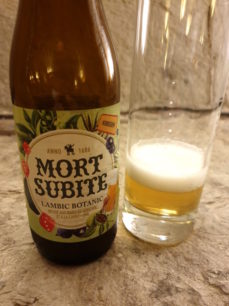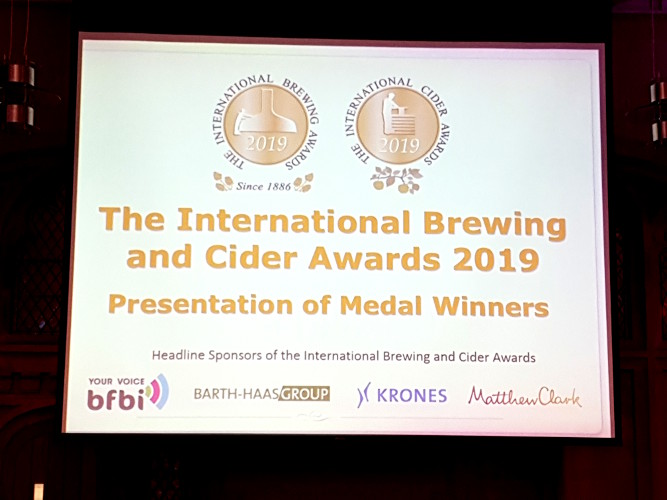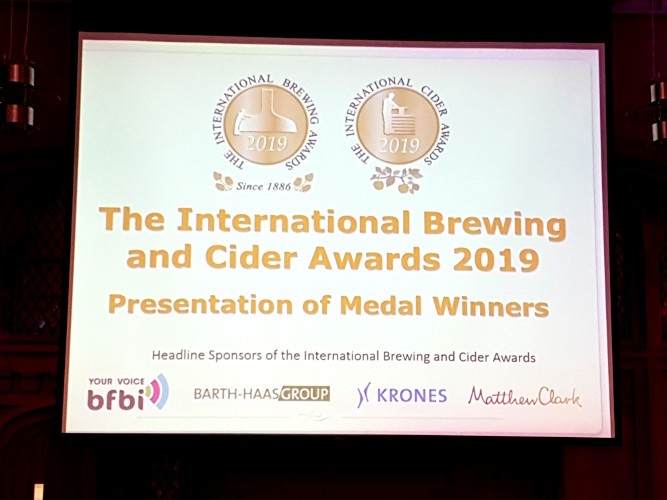The best of the best!
There may have been a red carpet, but there were no tearful acceptance speeches and definitely no divas!
The International Brewing & Cider Awards Ceremony is known as ‘The Oscars’ of the beer and cider industry. Rybeck was present to see the medals presented and to hear the 2019 champions being announced for the first time. There was also a unique opportunity to speak to two of the principal organisers.
Oscars of the Beer and Cider World
The International Brewing Awards and International Cider Awards are among the most prestigious of their kind. Judged by industry peers, they highlight the best beers and ciders in the world. They are known for having the highest of standards and are regarded as ‘the awards to win!’ This biannual competition is the oldest beer and cider awards still running in the world, dating back to the late 1880s. The Brewing Awards were first held in 1888. The Cider Awards, beginning 1901, were reintroduced in 2013 after a break during the 1960s.
The 2019 awards ceremony was held on 1st May in London’s Guildhall. Guests had a chance to taste many of the winning beers and ciders. Like the 51 judges from over 20 countries, these also came from all over the world. There were 1000 entries with 66 beer medals awarded to breweries from 21 countries. Additionally, 19 cider medals were awarded to competitors from 11 countries. As Chairman of Judging, Bill Taylor, remarked: “the awards have an international footprint true to their name.”
Origins of the Competition
The competition grew out of the Brewers’ Exhibition, first held in 1879 in London and then held annually for the next 15 years. This exhibition was a showcase for technological innovations in brewing equipment and other drinks machinery. It was here that the brewery competition started. Word then spread through advertising and via people who had already visited. “This competition existed before beer competitions were fashionable“, notes Bill. “It came out of a group of industry people and it’s still run that way. Over time, that created a sense of loyalty, identity and lay the foundations for the future.”
Evolution and Endurance of the Awards
The competition has evolved over its 130 year history to reflect many developments in the global beer and cider market. This year saw more classes and so more medals than ever before. “We try to reflect changes in the marketplace“, explains Bill. “For example, a few years ago we introduced a Special Hopped Beers category. If you visit pubs around the world, you see blackboards advertising beers with hop varietal names. Consumers are speaking that language now. We saw that as a trend and so wanted to provide an opportunity for beers defined by hops. These could be lagers, IPAs or some innovative style that someone’s created. So rather than breaking down into individual styles, we have Special Hopped Beers – beers defined by hops. This is what connects to the consumer.”
The Judges
The raison d’être of the competition is to award excellence in brewing and cider making. This relies on having the best judges. They are all brewery and cider professionals working in commercially operating breweries and cider businesses. They are responsible for bringing beers and ciders to market. Therefore, judges include many head brewers plus production directors, top sensory experts and others. Bill explains further: “We want people who understand how to select ingredients, transform them into a product in the glass and decide what goes to market. Our judges could have 30 years’ experience or be young brewers who’ve made a real impact in their local market doing something different and innovative. They have a mix of experience and diversity helps. Our judges work in a team. It’s the conversation and richness of that conversation that’s important. We need people who can listen more than they can talk.”

Ruth Evans MBE and Bill Taylor
The Judging Process
The judging panel focuses on quality and commercial worth from a professional and market perspective. They do not just rely on written style definitions. Judging is carried out through discussion rather than using a points system. Categories are broken down into classes defined primarily by ABV. This format clearly works, as the competition’s reputation has endured for so long. “We don’t try to categorise everything“, adds Bill. “We give judges permission to recognise excellence when they see it. For innovation, we’re providing opportunities that are somewhat unique. A controversial beer has to be talked through from a professional level. The pros and cons are discussed until a consensus can be met. Judges have to own their decisions and be prepared to talk about and justify them. It’s their reputation that’s on the line.”
Another unique feature of the competition is that judges also decide the colour of the medals awarded. Thus a Gold, Silver and Bronze are not guaranteed for every class or category. This would usually affect categories with a smaller number of entries. For example, the new class of Zero Gluten Beer received fewer entries than the Gluten Free one. Consequently, this year the judges agreed to award a Silver medal only for Zero Gluten and a Gold and Silver for Gluten Free.
Reputation, Relevance and Prestige
It’s not easy to win an award at this competition, which is part of the reason why they are so well regarded. “Our awards are known as the Oscars“, says Chief Executive of the Awards, Ruth Evans MBE. “They are peer reviewed and very well regarded, celebrating excellence. The big difference with our competition is that it’s run by the industry for the industry on a not-for-profit basis. When beer is not quite so popular, our awards will still be going!”

Trophy winners celebrate their win outside London’s Guildhall
Championship Winners Trophies
Beer Trophy Winners
The awards ceremony also revealed the Trophy winners, recognising just nine beers and three ciders as outstanding examples in their respective categories. Judges sit in silence and are presented with the Gold medal winners. They then vote in a secret ballot for the beers and ciders that they think are the ‘best of the best’ in a marketplace context. As Ruth describes, these are the products that “the judges would be prepared to stake their future success on.” All beers and ciders are tasted blind in the competition and the championship winners have been tasted at least three times.
Winning a trophy at the Oscars of the beer and cider world is hugely significant for breweries and cider companies. It represents recognition of the high quality of their products from industry peers and professionals. As Bill remarks, “there can only be one best picture, so there can only be one gold medal. We ask the judges to pick the best – that’s what we’re looking for. It’s a career-defining moment!”
Changes Reflect the Market
The competition has evolved over time to reflect the state of the market. Changes have already seen new categories, including non/low alcohol beers and gluten-free, for example. Although these may represent a niche area, “they need to be recognised and their excellence rewarded“, according to Bill. Interest from brewers is growing too. “Low and no alcohol beer certainly grew as a category this year with double the number of entries from the last time“, confirms Ruth. “We’re seeing a more sophisticated and stylistic approach to these now”, adds Bill. “The consumer is responding more favourably.”
Growth in Beer and Cider Classes
Since their reintroduction into the competition, the number of cider classes has grown every two years and is set to continue in this way. “We’re trying to grow the cider competition“, explains Bill, “but you can only grow at a certain rate. You have to earn the trust and involvement of the industry and re-own it. Unlike beer, the competition had not been involved with cider for a number of decades.”

Alken-Maes Mort Subite Botanic Lambic – one of the Gold Medal winners
Similarly, the number of beer classes is also likely to grow. This reflects the increased interest in beer among consumers, particularly for new styles and flavours. Both Ruth and Bill see the future of beer as very positive. They note that it’s becoming more of a gastronomic drink, reflected by the rise of gastropubs and craft beer bars. “It’s not simply an alcoholic drink“, notes Bill. “Younger generations are showing a greater interest in drinking more moderately but with more flavour.”
The Future
The International Brewing & Cider Awards celebrate and reward the best of the global beer and cider industry. They also show a confident outlook for the future of these drinks in a world beset with economic uncertainty. Although Brexit is clearly a serious worry for many in the drinks industry, Bill offers some welcome light relief. “If people worry, they’ll go to the pub and have a beer or cider. If people are happy, something good happens and they want to celebrate, they’ll go to the pub and have a beer or cider!” Let’s all hope that as many of these beers and ciders as possible will soon be available to consumers throughout the UK.
Author – Robin Goldsmith






